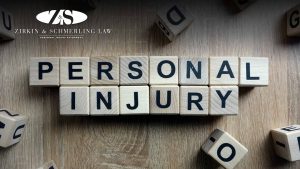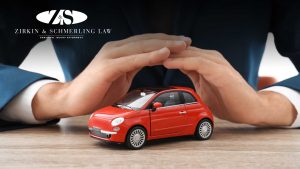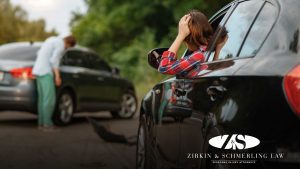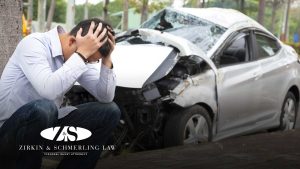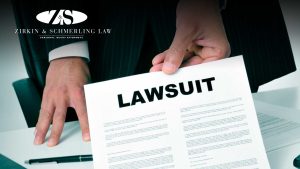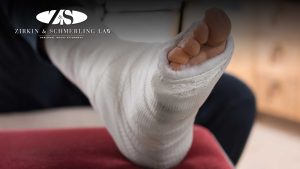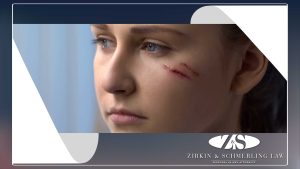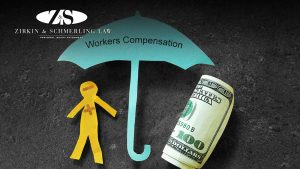
Rollover accidents are some of the most devastating and dangerous types of car accidents. These accidents are characterized by a vehicle flipping over, often resulting in severe injuries or fatalities. Because of the complexity involved in rollover Maryland car accident cases as well as dealing with insurance companies, it’s crucial to have experienced Maryland car accident lawyers on your side to help you navigate the legal process and secure the compensation you deserve.
When a vehicle rolls over, the results can be catastrophic. Occupants may be crushed, ejected, or suffer life-threatening injuries. In many cases, these serious auto accidents are caused by negligence, drunk driving, defective vehicles, or poor road conditions.
The Importance of Maryland Car Accident Lawyers
Maryland car accident lawyers can assist with every aspect of your case. Proving fault in a rollover accident can be complicated, so it’s valuable to have a qualified Maryland personal injury attorney. They will gather evidence, handle communications with the insurance company, and advocate for your rights in court if necessary. With so much at stake, including extensive medical bills, lost wages, and pain and suffering, it’s critical to have a skilled car accident lawyer who understands Maryland law and the complexities of accident cases.
If you’ve been involved in a rollover, contact the Maryland car accident attorneys at Zirkin & Schmerling. Call 410-753-4611 for a free evaluation from an experienced personal injury lawyer.
Understanding the Impact of Rollover Car Accidents
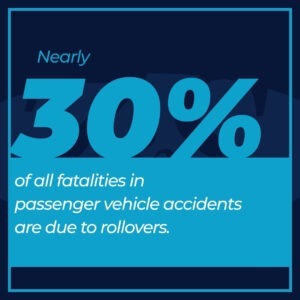
Rollover car accidents account for only a small percentage of total auto accidents but contribute disproportionately to serious injuries and fatalities. According to the National Highway Traffic Safety Administration (NHTSA), rollovers represent nearly 30% of all fatalities in passenger vehicle accidents despite making up only 2.1% of total accidents.
The impact of a rollover car accident can cause extensive injuries to occupants, particularly when the vehicle’s roof collapses or passengers are ejected from the vehicle. These accidents are more likely to result in traumatic brain injuries (TBI), spinal cord injuries, and other catastrophic outcomes.
One of the most dangerous outcomes in a rollover auto accident is the ejection of occupants. When seat belts are not worn or the vehicle is poorly designed, passengers can be thrown from the vehicle during the rollover. Ejection dramatically increases the likelihood of severe injury or death. Victims who survive an ejection often suffer from long-term disabilities and require ongoing medical care.
Common Injuries in Rollover Car Accidents
Injuries sustained in a rollover car accident are often more serious than in other types of car accidents due to the violent nature of these crashes.
Some of the most common injuries include:
- Broken Bones: The force of a rollover accident can cause fractures in the arms, legs, ribs, and pelvis. Broken bones may require surgery and months of recovery, and some victims are left with permanent disabilities.
- Internal Injuries: The crushing impact of a rollover can lead to internal bleeding and damage to vital organs, such as the liver, spleen, and kidneys. These injuries are life-threatening and often require emergency surgery.
- Psychological Trauma: Surviving a rollover auto accident can have lasting psychological effects. Many victims experience post-traumatic stress disorder (PTSD), anxiety, and depression following their accident.
Traumatic Brain and Spinal Cord Injuries
Among the most severe car accident injuries in a rollover car accident are traumatic brain injuries (TBI) and spinal cord damage. TBIs range in severity from mild concussions to severe, life-altering conditions that require long-term care. The brain’s delicate tissues can be damaged by the sudden impact of the brain colliding with the skull during a car crash.
For many victims, the road to recovery after a TBI is long and arduous. Some may never fully recover their cognitive or physical abilities, and the cost of treatment and rehabilitation can be overwhelming.
Spinal cord injuries are another catastrophic outcome of rollover car accidents. The spinal cord is a crucial part of the central nervous system, responsible for transmitting signals between the brain and the rest of the body.
When the spinal cord is damaged by car collision, it can result in:
- Paraplegia: Paralysis of the lower half of the body
- Quadriplegia: Paralysis of all four limbs
Victims of spinal cord injuries often require intensive rehabilitation, assistive devices like wheelchairs, and home modifications to accommodate their new needs. The emotional toll of such an injury can also be immense, affecting not only the victim but also their family.
If you or a loved one has suffered a TBI or spinal cord injury in a rollover auto accident, it’s essential to pursue compensation from the other driver’s insurance company to cover these expenses. Car accident lawyers understand the legal system and can get you the compensation you need after a serious injury like a traumatic brain injury or spinal cord injury.
Steps To Take After Rollover Auto Accidents
If you’ve been involved in a rollover accident, taking the right steps immediately after the car crash can help protect your health and legal rights.
Here’s what you should do:
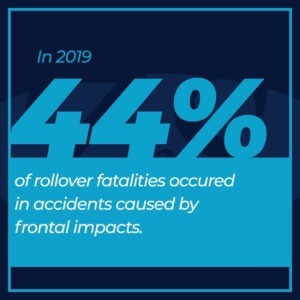
Seek Medical Attention: Even if you don’t feel hurt, it’s important to get checked out by a medical professional. Some injuries, like internal bleeding or concussions, may not be immediately apparent. Getting medical treatment immediately is crucial to ensuring your safety and recovering damages. Keep all medical records and follow your doctor’s instructions closely, as this documentation can be essential for your injury claim.
Document Where the Accident Occurred: Take photos of the car collision scene, including the vehicles involved, road conditions, and any visible injuries. Also, photograph traffic signs, skid marks, and weather conditions to help establish fault.
File a Police Report: Reporting the accident to the police is crucial for creating an official record of the car crash, which can be used by your personal injury lawyer as evidence in your case. Ask for a copy of the report for your records.
Collect Contact Information: Get the names and contact details of any witnesses to the accident and the other driver’s insurance information. If possible, record brief witness statements while the incident is still fresh in their minds.
Contact an Attorney: The sooner you reach out to a Maryland car accident lawyer, the sooner they can investigate your case and protect your legal rights. Your attorney can also communicate with the insurance companies and ensure you meet all legal deadlines.
Assessing the Damage
After a rollover automobile accident, your vehicle will likely need to be inspected by a professional to assess the extent of the damage. Rollover automobile accidents often result in extensive damage to the vehicle’s frame, engine, and body. Getting your vehicle properly assessed by a professional can help determine the following:
- Repair Costs: If your vehicle can be repaired, the at-fault party’s insurance company should cover the repair cost.
- Total Loss: If the vehicle is deemed a total loss, you may be entitled to compensation for its fair market value. This amount should cover the cost of replacing it with a similar make and model.
Insurance companies will likely minimize your claim and diminish the impact of your suffering after the accident. Car accident lawyers help you navigate the property damage part of your auto insurance claim and ensure that you receive fair compensation for the loss of your vehicle.
Determining Fault in Rollover Car or Truck Accidents
Determining fault in a rollover accident is a critical part of securing compensation. There are several potential causes of rollover car accidents, and understanding who is responsible is key to building a successful case.
The other driver and their insurance company may attempt to deny liability, making it important to have strong legal representation.
Negligent Parties in Your Rollover Car Accident May Include:
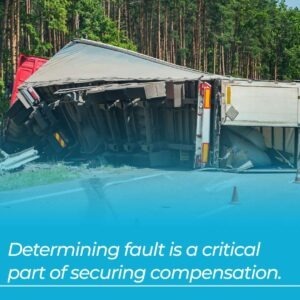
- Negligent Drivers: If another driver’s reckless behavior, such as speeding or driving under the influence, caused your accident, they could be held liable for your injuries. An experienced personal injury lawyer can help gather evidence and build a strong case to support your claim.
- Vehicle Defects: Some car accident cases are caused by defects in the vehicle itself. For example, faulty tires, poor suspension systems, or other mechanical issues may lead to a rollover. In these cases, the vehicle manufacturer may be held accountable.
- Poor Road Conditions: Hazardous road conditions, such as potholes, debris, or poorly maintained roads, can contribute to rollover accidents. In these cases, the government entity responsible for maintaining the road could be liable. However, filing a claim against a government agency often involves strict deadlines and specific legal procedures.
The Role of Expert Testimony in a Rollover Car Accident Lawsuit
In many rollover accident cases, proving fault and securing compensation requires expert testimony. Experts can provide valuable insights into the cause of the accident and the extent of your injuries.
Some of the most common experts used in rollover accident cases include:
- Accident Reconstruction Specialists: These experts recreate the events and help your accident lawyers determine how the rollover occurred and who is responsible. Their findings can be crucial in establishing liability.
- Medical Experts: A medical expert can testify about the severity of your injuries and the long-term impact on your health and quality of life. This testimony is often used to support your auto accident lawyer’s claims for medical expenses, including medical treatment, pain and suffering, and other damages.
- Vehicle Engineers: In cases where a vehicle defect contributed to the rollover, an engineer can analyze the vehicle’s design and components to determine if the manufacturer is at fault. They are crucial in helping your auto accident lawyer hold negligent manufacturers responsible for damages resulting from the accident.
If expert testimony is needed to support your rollover accident case, contact the accident lawyers at Zirkin & Schmerling. Our law firm works with top experts to build strong cases for our clients.
Types of Compensation Available After a Rollover Accident

Victims of rollover auto accidents can seek compensation for various damages. The goal of compensation is to help you recover from the financial, physical, and emotional toll the auto accident injuries have taken on your life.
Your Maryland car accident lawyer may be able to secure compensation for:
Medical Expenses
Medical bills are often the most significant cost a rollover car accident victim struggles with.
This can cover medical treatments like:
- Emergency room visits
- Surgery to repair injuries or prevent future harm
- Physical therapy to regain mobility
- Long-term care if injuries are severe
Lost Wages and Reduced Earning Capacity
After a rollover car accident, many victims are unable to return to work immediately. Some may be unable to work for an extended period, while others may never return to the same level of employment they had before their serious car crash accident. Compensation for missed wages is essential to ensure that car crash victims maintain financial stability during recovery.
Lost wages include any income you could not earn due to the accident and the recovery period.
This can include:
- Missed Work: Time away from work due to hospitalization, surgery, rehabilitation, or mental distress
- Lost Benefits: Loss of employee benefits such as health insurance or retirement contributions
- Future Lost Income: In cases of permanent disability, victims may be unable to return to their previous jobs or need to take a lower-paying position. Compensation should account for this long-term loss of income.
Every experienced auto accident lawyer in our office knows how to build a case that will stand up to the insurance company’s attempts to deny your claim.
Pain and Suffering: More Than Just Physical Injuries

In addition to compensation for medical expenses and lost pay, victims of rollover car accidents can seek compensation for pain and suffering. This type of compensation is meant to address the physical pain and emotional distress that comes with being injured in a severe motor vehicle accident.
These damages can be difficult to quantify, but they are just as real as the financial losses.
Pain and suffering may include:
- Physical Pain: The discomfort and limitations caused by injuries such as broken bones, spinal cord damage, or head trauma
- Emotional Distress: Anxiety, depression, or PTSD that results from the trauma of the accident
- Loss of Enjoyment of Life: The inability to participate in activities that once brought joy, such as hobbies, sports, or spending time with family and friends.
Unlike medical bills or missed paychecks, there is no direct dollar amount for pain and suffering. However, the best accident lawyers know to calculate an appropriate amount based on the severity of your injuries, the impact on your life, and similar car accident cases.
Compensation for pain and suffering is critical to your recovery, but you may have to fight the insurance companies to include it in your settlement. It acknowledges that the emotional and physical toll of the accident can be just as debilitating as the financial costs.
A car accident lawyer from the law firm of Zirkin & Schmerling knows that car crashes often lead to emotional distress and are ready to ensure your compensation reflects this with a free legal consultation.
Property Damage: Replacing or Repairing Your Vehicle
In addition to personal injuries, a rollover car accident can significantly damage property. The vehicle involved in the car accident claim may be severely damaged or completely totaled, and repairing or replacing it can be a major expense. Recovering compensation for your damaged property becomes even more complex if you or the at-fault party does not have personal injury protection.
Compensation for property damage is an important part of a car accident insurance claim, ensuring that victims can recover the financial loss of their vehicle. Motor vehicle accident lawyers know how to recover compensation for property damaged or destroyed in auto accident cases.
Loss of Consortium: The Impact on the Victim’s Family
In some serious personal injury lawsuit cases, the injuries sustained by the other driver in a rollover accident can affect more than just the victim. Spouses and family members may suffer serious injuries as well, particularly if the victim’s injuries prevent them from providing the same level of companionship, support, or intimacy as before the accident. This is known as loss of consortium and is a compensable damage in a personal injury claim.
What Is Loss of Consortium?
Loss of consortium refers to an injury’s impact on the relationship between the victim and their spouse or family. For example, if a victim is paralyzed in a rollover accident, they may no longer be able to engage in physical activities with their spouse or care for their children. This can lead to a significant strain on the family, both emotionally and financially.
Relationships impacted include:
- Spousal Relationships: A spouse may be entitled to compensation if the victim’s injuries prevent them from maintaining the same level of intimacy, companionship, or support.
- Parental Relationships: Children may also suffer if their parents are unable to provide the same level of care, guidance, or emotional support due to their injuries.
Loss of consortium is a non-economic damage, meaning it does not have a direct financial cost. However, it is a very real loss, and compensation can help alleviate some of the emotional and financial burdens placed on the family.
Call Zirkin & Schmerling at 410-753-4611 for a free legal evaluation if your family has been affected by a rollover accident.
Statute of Limitations for Rollover Accident Claims in Maryland

Maryland has a strict statute of limitations for filing a personal injury lawsuit after a car accident. This means your auto accident lawyers have limited time in which to take legal action and seek compensation for your injuries and damages. Failing to file within this time frame can result in losing your right to recover any compensation.
In most auto accident cases, the statute of limitations for personal injury lawsuits and claims in Maryland is three years from the car accident date. There are some exceptions for a more complicated car accident case, but these are rare. Be sure to speak with an experienced Maryland car accident attorney today if you think there are special circumstances in your case.
Each Zirkin & Schmerling car accident lawyer will stand up to the insurance company’s attempts to deny your claim and ensure all legal deadlines are met.
Why Acting Quickly Is Important After Car Accidents
If you miss the deadline to file your lawsuit, you may lose your right to seek compensation. This can leave you responsible for covering the costs of your medical bills, lost wages, and other expenses out of pocket. Additionally, waiting too long to file a claim can make it harder to gather evidence and build a strong case.
If you’ve been injured in a rollover car accident lawsuit, it’s essential to speak with an attorney as soon as possible to ensure your case is filed within the statute of limitations.
Maryland Car Accident Claim Process

Filing car accident claims can be complex, especially when dealing with insurance companies. Your attorney will guide you through the entire Maryland claim process, ensure all evidence is gathered, deadlines are met, and negotiate with the insurance company professionally. This includes collecting police reports, medical records, witness statements, and documentation of property damage.
In some cases, the other driver’s insurance company may attempt to dispute the claim or offer a lower settlement. Your attorney will fight to ensure that your Maryland personal injury claims result in a fair and just outcome. If necessary, they can file a lawsuit and represent you in court, ensuring your legal rights are protected throughout the litigation process.
Understanding Maryland’s contributory negligence rule—which can bar recovery if you’re found even slightly at fault—makes skilled legal representation essential. Your lawyer will work diligently to build a strong case and maximize your compensation.
How a Good Accident Lawyer Helps Your Case
Hiring a Maryland car accident lawyer is one of the most important steps you can take after a rollover accident.
Here’s how a Maryland auto accident attorney can help:
- Investigating the Accident: Your attorney will gather evidence to determine who is at fault for the rollover. This includes collecting witness statements, reviewing the police report, and working with accident reconstruction experts to prove you deserve the insurance settlement you’re trying to get.
- Handling Negotiations: Insurance companies often try to offer low settlements to accident victims. Your Maryland car accident attorney will handle all communications with the insurance company and negotiate a fair settlement on your behalf.
- Filing a Lawsuit: If the insurance company refuses to offer a fair settlement, your car accident attorney can file a lawsuit and take your case to court to ensure you receive the compensation you deserve.
At Zirkin & Schmerling, we are a law firm dedicated to helping rollover accident victims recover the compensation they need to move forward with their lives.
Get Support From a Maryland Car Accident Lawyer
If you or a loved one has been injured in a rollover accident, you deserve experienced legal representation to help you navigate the complexities of your case. At Zirkin & Schmerling, our skilled Maryland car accident attorneys understand the challenges of serious accidents and are dedicated to fighting for the compensation you need.
Whether it’s covering medical bills, lost pay, or pain and suffering, we’ll handle the legal work so you can focus on healing.
Don’t wait—contact us today for a free consultation at 410-753-4611 to discuss your case.

